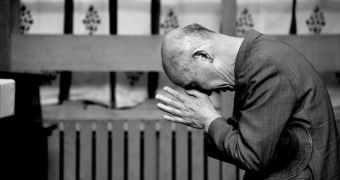Queen's University scientists say that religious individuals are more likely to use their beliefs for improving self-control, even though they largely do so unconsciously. In fact, simply thinking about religion was linked to this positive effect, the investigators explain.
In a series of experiments, scientists asked test subjects to unscramble a series of sentences that contained a high density of religiously-oriented words. Most people involved in the study exhibited higher amounts of self-control immediately afterwards.
The lead researcher on the new study was QU psychology graduate student Kevin Rounding. He explains that each participant had to unscramble a sentence featuring five words, mixed up in no particular order. Some of the sentences contained religious words, while others did not.
As soon as this stage of the research was completed, the test subjects were asked to participate in a series of tasks meant to gage self-control. These included delayed gratification, enduring discomfort, suppressing impulsive responses, and being patient.
When researchers analyzed the patterns in which each participant handled the tasks they were allotted, they discovered that those who unscrambled sentences containing religion-oriented words tended to become more capable of exerting self-control, PsychCentral reports.
The team published details of the new research, and its full conclusions, in the latest issue of the renowned medical journal Psychological Science. The data can now be used to better understand religious people and the way they behave.
“Our most interesting finding was that religious concepts were able to refuel self-control after it had been depleted by another unrelated task,” Rounding explains.
“In other words, even when we would predict people to be unable to exert self-control, after completing the religiously themed task they defied logic and were able to muster self-control,” he goes on to say.
Rounding adds that the new investigation proves a practical use for religion that some researchers had no idea existed. Thus far, it was widely believed that religion is only a matter of faith and personal preference.
“This research actually suggests that religion can serve a very useful function in society. People can turn to religion not just for transcendence and fears regarding death and an afterlife, but also for practical purposes,” the investigator concludes.

 14 DAY TRIAL //
14 DAY TRIAL //